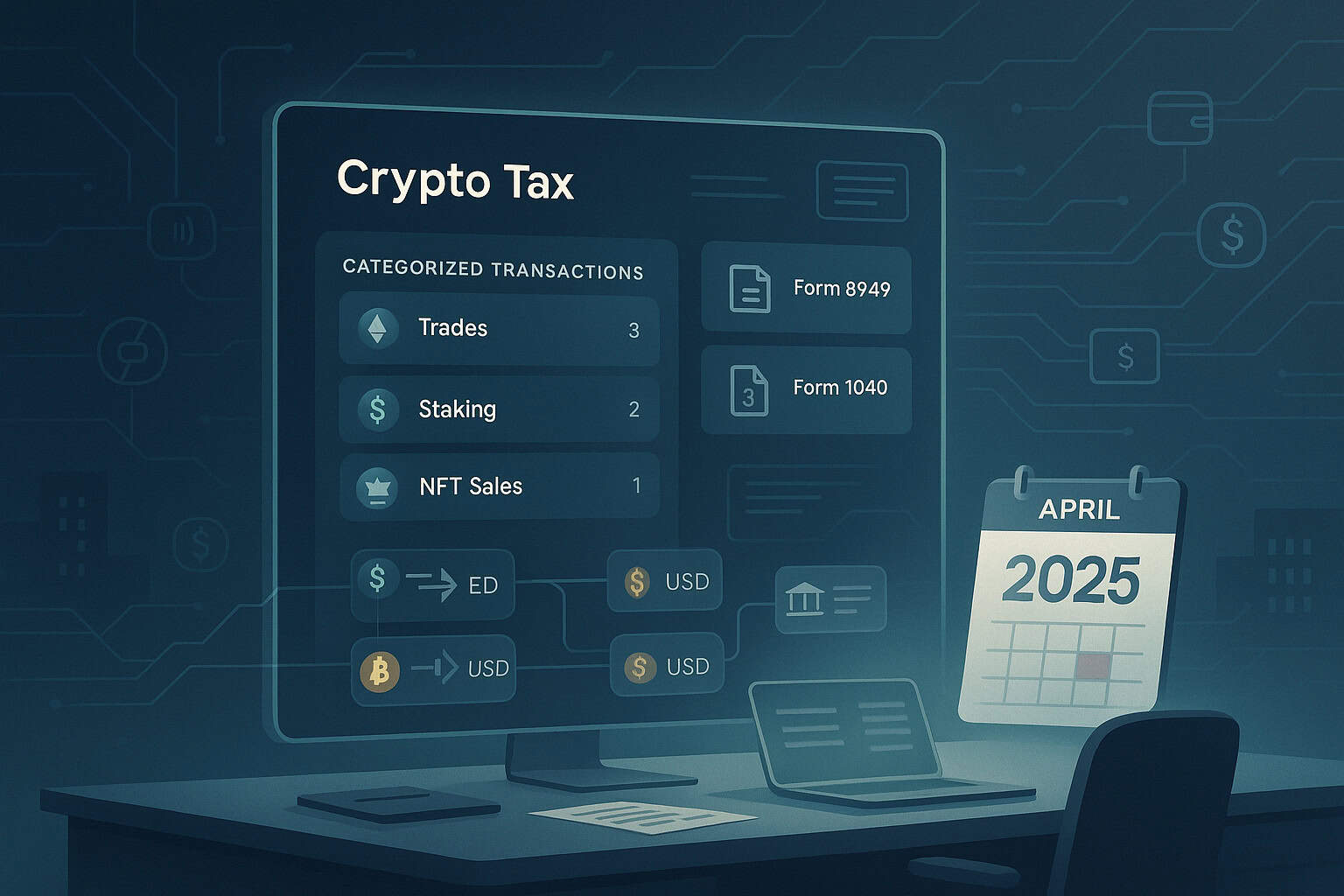Last Updated on April 5, 2025 by Patrick Camuso, CPA
As the cryptocurrency landscape evolves, understanding crypto tax compliance has become increasingly important for investors, traders, and businesses alike.
With the IRS implementing new rules and forms for the 2025 tax year, taxpayers dealing with digital assets must stay informed to ensure crypto tax compliance and optimize their tax outcomes. A digital asset is stored electronically and can represent value, typically recorded on a cryptographically secured ledger.
The Internal Revenue Service reminds taxpayers they must answer the digital asset question and report all digital asset related income when they file their 2023 federal income tax return. The digital asset question requires taxpayers to indicate if they received or disposed of a digital asset during the tax year.
This article provides a comprehensive guide on reporting cryptocurrency transactions, managing gains and losses, and navigating the latest tax regulations affecting the crypto community.
Key Takeaways
- The IRS will introduce Form 1099-DA in 2025, requiring brokers and exchanges to report detailed cryptocurrency transactions to both taxpayers and the IRS.
- Taxpayers must adopt account-based accounting per Revenue Procedure 2024-28, tracking crypto holdings and calculating gains or losses separately for each account.
- Enhanced third-party reporting increases IRS visibility into crypto activities, making accurate record-keeping and real-time transaction tracking essential.
- Precise accounting helps avoid overpaying taxes, supports audit defense, and is especially important for complex activities like staking income, airdrops, and hard forks.
- Web3 businesses and high-volume traders face increased crypto tax compliance demands under the new rules, while losses from lost or stolen crypto are generally non-deductible.
- Capital gains from digital assets can be classified as short-term or long-term based on the holding period.
Understanding the 2025 Crypto Tax Compliance and Landscape

In 2025, the IRS is intensifying its oversight of cryptocurrency transactions, emphasizing the need for transparency and accuracy in tax reporting. Taxpayers must answer the digital asset question on their federal income tax return, disclosing all relevant income from cryptocurrency transactions. This includes proceeds from sales, trades, exchanges, staking rewards, mining income, and other taxable events.
For tax purposes, digital assets are classified as capital assets. This means that general property tax rules apply when calculating capital gains and losses. Each transaction involving a digital asset, whether it’s selling Bitcoin, trading Ethereum for another token, or earning staking income, can have tax consequences that affect your overall taxable income. The cost basis of a digital asset is generally its cost in U.S. dollars. Long-term capital gains tax rates apply if the asset was held for more than one year, while short-term capital gains are taxed at ordinary income tax rates.
IRS Form 1099-DA: A New Era in Reporting
Starting in 2025, the IRS requires brokers and cryptocurrency exchanges to issue Form 1099-DA to taxpayers and the IRS, providing a detailed account of each crypto transaction within the tax year. This new form replaces previous reporting gaps, ensuring the IRS receives the same transaction data as taxpayers do. The digital asset question appears at the top of several federal income tax forms, including Forms 1040, 1040-SR, and 1040-NR.
Form 1099-DA applies to various tax filings, including Forms 1040, 1040-SR, 1040-NR, 1041, 1065, 1120, and 1120-S. All taxpayers must answer “Yes” or “No” to the digital asset question on their tax returns, confirming whether they engaged in any digital asset transactions during the year.
Transactions covered include buying, selling, trading, or exchanging digital assets. Accurate tracking of the cost basis, the original value of the asset—is essential to prevent overpaying taxes or facing penalties due to misreporting.
Expert Insight – Patrick Camuso, CPA:
“This marks a turning point. The IRS will now have full transaction visibility, making accurate cost basis tracking non-negotiable.”
Transition to Account-Based Accounting
With the adoption of Revenue Procedure 2024-28, taxpayers must now track their crypto holdings on a per-account basis instead of aggregating all wallets and exchanges together. This change eliminates the practice of cherry-picking cost basis across multiple accounts, requiring precise accounting for each wallet or exchange separately.
This means you must determine the holding period and calculate capital gains and losses for every transaction within each account. The new rules take effect beginning January 1, 2025, so taxpayers should prepare for this transition immediately.
For example, if you hold Bitcoin in two different cryptocurrency exchanges, you must calculate gains or losses independently for each exchange account, rather than combining transactions across both.
Increased IRS Visibility Through Third-Party Reporting
The IRS’s enhanced access to transaction data through brokers’ direct reporting increases the likelihood of audits if reported figures do not align with broker records. To avoid discrepancies in your crypto taxes , real-time tracking and reconciliation of your crypto transactions are critical.
Best practices to maintain crypto tax compliance include using reliable crypto tax software that integrates with your wallets and exchanges, keeping audit-ready records throughout the year, and promptly updating your cost basis after every transaction. Many crypto tax software solutions integrate with virtual currency brokers and digital wallets, making it easier to track and report transactions accurately.
By doing so, you can accurately report capital gains, capital losses, and other taxable events, reducing the risk of costly corrections or penalties.
Accurate Accounting as a Strategic Advantage
Maintaining precise and comprehensive records of your cryptocurrency transactions offers several benefits. Accurate accounting helps you avoid overpaying taxes by ensuring that your cost basis is correctly reported, which directly impacts your capital gains tax liability and any potential capital loss . Many investors benefit from using crypto tax software to simplify tax reporting and tracking for cryptocurrency activities. Crypto tax software can generate complete tax forms quickly by crunching users’ transaction data, saving time and reducing errors.
Proper documentation also strengthens your position in the event of an IRS audit, allowing you to defend your reported figures with confidence. Additionally, detailed records prevent the need for costly amendments or corrections to your tax returns.
Special attention is required for complex activities such as staking income, airdrops, and hard forks, where valuation and timing can affect your taxable income and reporting obligations. Additionally, you can donate cryptocurrency to qualified charitable organizations and claim a tax deduction based on its fair market value without paying capital gains taxes, making it a strategic option for reducing tax liability. A taxpayer who disposed of any digital asset by gift may be required to file Form 709, United States Gift Tax Return.
Impacts on Web3 Businesses and High-Volume Traders
For entities involved in the Web3 ecosystem, such as decentralized autonomous organizations (DAOs), NFT marketplaces, and high-frequency crypto traders—the new tax rules introduce increased administrative burdens. These businesses must adhere to detailed wallet-level reporting and manage higher crypto tax compliance costs.
It is important to note that losses resulting from lost or stolen cryptocurrency are generally not deductible, which can affect your overall tax strategy.
Frequently Asked Questions on Reporting Cryptocurrency Taxes
Do I need to report crypto under $600?
Yes. All taxable events, regardless of amount, must be reported to the IRS.
Is buying crypto taxable?
No. Purchasing cryptocurrency is not a taxable event. Taxes apply when you sell, trade, or use crypto.
Can I file my own crypto taxes?
While possible, the increasing complexity of crypto tax rules often makes professional guidance advisable.
What happens if I don’t report?
Failure to report crypto income or gains can result in penalties, interest, and potential enforcement actions for tax evasion.
How do I report cryptocurrency income?
You must report cryptocurrency income on your tax return, including wages paid in crypto, mining rewards, staking income, and payments for goods or services. If an employee was paid with digital assets, they must report the value of assets received as wages.
What tax forms do I need to file for crypto transactions?
Common forms include Form 8949 for reporting sales and exchanges, Schedule D for capital gains and losses, Schedule C for business income, and Form 1099 variants for certain income types.
How is capital gain or loss calculated on crypto?
Capital gain or loss is the difference between the fair market value at the time of sale or exchange and your cost basis, adjusted for any fees.
Are crypto hard forks and airdrops taxable?’
Yes. Tokens received from hard forks or airdrops are generally considered taxable ordinary income when received.
Do I have to pay taxes on staking income?
Yes. Staking rewards are treated as ordinary income and must be reported at their fair market value when earned.
Can I deduct losses from lost or stolen cryptocurrency?
Generally, losses from lost or stolen crypto are not deductible on your tax return under current IRS guidelines.
Immediate Steps for 2025 Crypto Tax Compliance
To prepare for the upcoming tax year, consider upgrading your accounting systems to support per-account tracking of your digital assets and ensure accurate reporting of long term capital gain . Make sure to set your accounting method preferences with brokers to align with the new regulations.
Working with a knowledgeable crypto tax professional can help you navigate complex transactions and optimize your tax position.
Patrick Camuso’s Advice:
“Start preparing now. Delaying until January could cost you far more in penalties and lost opportunities.”
How Camuso CPA Can Help in Your Crypto Tax Compliance
At Camuso CPA, we specialize in helping clients comply with the latest crypto tax compliance and regulations, including Revenue Procedure 2024-28. Our services include cost basis verification, audit defense, and guidance on complex transactions such as staking income, charitable contributions of cryptocurrency, and reporting on Schedule C, Schedule D, and Form 8949.
Whether you are an individual investor or a Web3 business, we provide tailored solutions to accurately report crypto on your tax return and minimize your tax liability.
Get started today: Book a Strategy Call or Download Our 2025 Crypto Tax Guide.
Why Early Preparation Matters
With the introduction of Form 1099-DA, the shift to account-based accounting, and expanded third-party reporting, the IRS is entering a more stringent phase of cryptocurrency tax enforcement. Proactively preparing your tax reporting systems and documentation safeguards your capital and helps you avoid costly mistakes.
By acting today, you can ensure your 2025 crypto tax reporting and payment are accurate, defensible, and strategically optimized, allowing you to confidently meet your crypto tax compliance and focus on your crypto investments.






